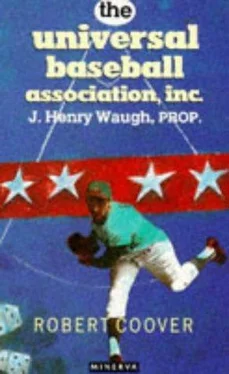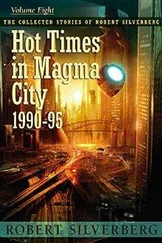"Why old Pappy Rooney, of course."
"Rooney! What did he do?"
"Lived to the age of a hundred and forty-three and, so they say, could get it up to the very end!"
'To the very end of what?" asks the Green Gringo.
"That's stupid!" Drew McSquire snaps.
"Stupid? I should say not! In fact, may we all, my friends, meet such a reasonable demise!"
"Death is never reasonable," argues Squire the great denier, "even for an old fool at one hundred and forty-three."
'Take it easy on Squire," laughs Skeeter. "He's writing a book on Jock Casey."
"So I've heard," says he whose very seams split with a loathing of giants. " It's The Man Who Stood Alone , isn't it?"
"That's right," says Squire grimly.
"If Squire writes it, then I shall bring out my long-awaited biography of Long Lew Lydell!"
Raspberry Schultz laughs and claps. "Wonderful! What are you going to call it, Cuss?"
" The Man Who Stood on his Bone! " Full-bellied laughter at last, which he gathers in, then adds:
"Said Fanny to the spectre
As soon as he'd decked her:
'Why, sir! you're positively pneumatic!
Unlike my old feller,
You tickle the cellar
Without making a mess in the attic!'"
But no rewards this time, for it's Dame Society herself who responds, a terrible roar dredged up from the very gut of the beast, a horrendous witless bellowing, that sucks up all their scrotums, and makes them catch their breath. Skeeter Parsons checks his timepiece: "It's time," he says. Trench and Ingram depart, under a cascade of cheers. But yes! It is really they! See how they go! Two still-young heroes of the golden past: miraculous transformation! And soon even he, Costen McCamish, will shrink instinctively to Tuck Wilson, step over the crushed skull and blinded eyes of that one who, in spite of all, must be loved, and walk the magic bases while the whore weeps. No cheers for him. Only survival.
Paul Trench, at the grim edge, too wise to step back and too frightened to leap, walks miserably toward the diamond beside Hardy Ingram, wanting to speak of it, his gloom, and why, but not knowing where to begin. Paul is a plain-spoken man, and his despair is too complex for plain speech. Though none would ever guess it, the thunder of the crowd only makes it worse. He is afraid. Not only of what he must do. But of everything.
Beyond each game, he sees another, and yet another, in endless and hopeless succession. He hits a ground ball to third, is thrown out. Or he beats the throw. What difference, in the terror of eternity, does it make? He stares at the sky, beyond which is more sky, overwhelming in its enormity. He, Paul Trench, is utterly absorbed in it, entirely disappears, is Paul Trench no longer, is nothing at all: so why does he even walk up there? Why does he swing? Why does he run? Why does he suffer when out and rejoice when safe? Why is it better to win than to lose? Each day: the dread. And when, after being distracted by the excitement of a game, he returns at night to the dread, it is worse than ever, compounded with shame and regret. He wants to quit — but what does he mean, "quit"? The game? Life? Could you separate them?
High in the stands, enjoying the rewards of mere longevity, sit the twelve Elders, his grandfather among them. In the government's official box, beside the Chancellor himself, sits his father. Though he knows they watch him, he doesn't look their way, afraid his own doubts will betray him. It began with them, after all. Discovering their fallibility, he encountered the pathos of all life, then reasoned that the Age of Glory was perhaps no different than this, his own inglorious times.
At first, he thought of it as tragic, saw himself as a kind of Damon Rutherford: young, brilliant. . dead. He became suspicious when he realized the idea gave him a certain grim pleasure. He became interested in Jock Casey then, felt the terror and excitement of the Great Confrontation, asserted himself and learned to hate — but discovered that, even here, there was something he was enjoying that seemed wrong, a creature of false pride. It was Barney Bancroft who led him to the final emptiness; at every point in the man's life, he found himself asking: but why go on? Bancroft went on, but gave no reasons. And wasn't that, finally, a kind of cowardice?
The green grass at the edge of the infield feels spongy to their cleats. They walk in silence, beneath the loud blessing of the exalted and exultant populace, onto the diamond itself. A sacred duty, his father said. But "sacred," what is that? The Whore-Mother, Costen calls the people: Is it they, is it she who defines it for them? Is it in her name that he must kill today? Or is it for the record books that we go on, exposing our destinies? "Exposing our destinies" — that book Raspberry gave him, called Equilibrium Through Intransigence . It was Raspberry Schultz one day who told him: "I don't know if there's really a record-keeper up there or not, Paunch. But even if there weren't, I think we'd have to play the game as though there were." Would we? Is that reason enough? Continuance for its own inscrutable sake?
He noticed back there in the bull pen how they all avoided him, how they talked about him, wrong about everything. They think he's a Damonite. He isn't. He has read all he can find on the Association's history, and he knows now he is nothing. He has relived the origins and growths of the Bogglers, the Legalists, the Guildsmen, has examined their aspirations and how they tried to realize them, has suffered the pain and shock of Bancroft's murder, has watched the rescue of the Association by Patrick Monday's Universalists— later called the Caseyites — and their efforts, honest enough, to bring order to the chaos, has cringed under their ultimate tyranny and joined with the first courageous Damonites in their small and secret meetings, then ascended with them, pious and forever amazed, through the long slow years, to power — and has discovered, in the end, his own estrangement from them all. If anything, he is simply a willing accomplice to all heresies, but ultimately a partisan of none — like fat Costen, a negator, without any hope of rediscovering affirmation. Not that Cuss is any help to him. Cuss mocks the regime and everything else, but his mockery encapsulates him, cuts him off from any sense of wonder or mystery, makes life nothing more than getting by with the least pain possible, and somehow, to Paul Trench, such a life seems less than human.
Casey, in his writings, has spoken of a "rising above the rules," an abandonment of all conceptualizations, including scorekeepers, umpires, Gods in any dress, in the heat of total mystic immersion in that essence that includes God and him equally. Of course, some say he never wrote it, it's all apocryphal, inventions of Monday and his Universalists, distorted by redactions without number, but no matter, the idea itself remains. What it leads to, though, is inaction, a terrible passivity: Casey on the mound, shaking Flynn off, waiting — but who is playing Casey today? And will he wait? Trench, alias Ingram the Avenger, squatting dutifully behind the plate to receive the last of Hardy Ingram's warm-up pitches, feels a tingle in his hands, a power there he neither wants nor asked for.
He'd like to trade places with Hardy. Against the rules, of course; Hardy couldn't do it, can't play your own progenitor. No, even better, he'd like to trade with Galen Flynn or whoever it is that's playing Casey. What would he do? He'd burn them in, that's what he'd do, try to strike Ingram out. Or: why not an intentional pass? Or bean him. How about that? Is Flynn-Casey thinking about that? Going for number two? Namely, him? Royce Ingram tries to kindle up an anger, but Paul Trench can't bring it off. I'll strike out.
Читать дальше












